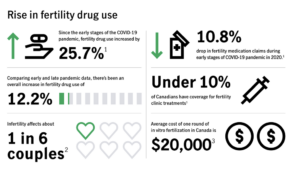In today’s workplaces, fostering an environment that supports women’s health is not just a moral imperative but a smart business strategy. Women constitute a vital workforce, bringing diverse perspectives and skills that drive innovation and productivity.
However, unique health challenges can sometimes hinder their professional development and well-being. In this article, we’re diving into promoting women’s health and why it matters in the office.
Key findings on women’s health in the workplace.
The report from Manulife, supported by Cleveland Clinic Canada and the womenmind initiative at CAMH, highlights trends and challenges in women’s health:
- Limited Access to Fertility Benefits: Fewer than 10% of Canadian employees have fertility treatment coverage. Employers can ease emotional and financial stress by expanding access to fertility benefits.
- Postpartum Mental Health: A significant 15.1% of women seek mental health treatment following pregnancy, with nearly half of these women seeking support for the first time. Proactive mental health programs are essential to address this gap.
- Menopause and Hormone Therapy: The use of hormone replacement therapy among women aged 45–65 increased by 21% between 2020 and 2023. Menopause symptoms often affect workplace performance, making supportive policies critical.
Why employers should care.

Neglecting women’s health issues can result in increased absenteeism, turnover and reduced productivity. Conversely, organizations that invest in these areas enjoy higher employee satisfaction, loyalty and workplace diversity. By addressing these health challenges, employers support their workforce and enhance their brand reputation as inclusive and progressive.
Actionable recommendations for employers.
- Enhance Health Benefits: Offer fertility benefits, hormone therapy coverage, and mental health support tailored to women’s needs.
- Normalize Conversations About Health: Encourage open discussions about women’s health to reduce stigma and create a culture of empathy and understanding.
- Provide Flexible Work Options: Accommodate employees managing health challenges, such as postpartum recovery or menopause symptoms, with remote work or flexible hours.
- Leverage Education and Awareness: Educate leadership and employees about the importance of women’s health to foster a more supportive workplace.
A vision for the future.
By prioritizing women’s health, businesses can create workplaces where all employees thrive. With informed policies and empathetic practices, employers can bridge gaps in healthcare access, reduce disparities, and empower women to achieve their full potential.
Investing in women’s health is more than an organizational responsibility—it’s an opportunity to foster a vibrant, inclusive, and forward-thinking workforce.
If you’re looking for more information on benefits specific to supporting women, call Navy & Sage Benefits!



